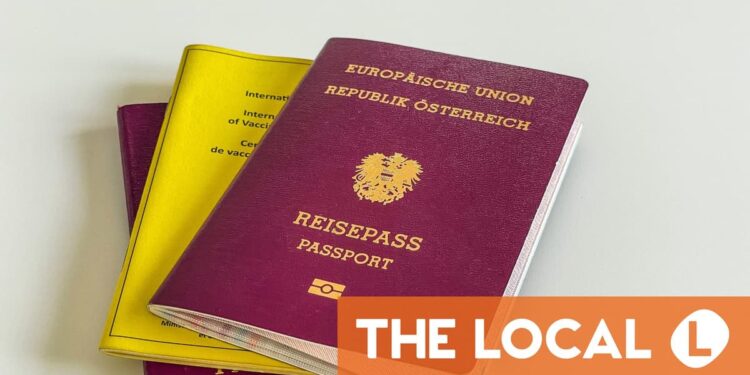Documents belonging to Noah Rohrlich’s grandfather, Fritz Rohrlich who fled Nazism in Austria. Photo: OLIVIER DOULIERY / AFP
They may have been targeted for other reasons, including political ones such as their support for democracy in Austria.
People who can also apply to have their Austrian citizenship restored include former Austrian citizens – as long as they weren’t deprived of it or explicitly renounced it. Deprivation typically only occurs if the citizen was found to have participated in terrorist acts.
Advertisement
A former Austrian citizen can reapply as long as they had citizenship for at least ten years before losing it, after being legally resident in Austria for at least a year.
Children who lost Austrian citizenship but weren’t deprived if it can typically reapply to become Austrian again if they do it between the ages of 18 and 20.
READ ALSO: How powerful is the Austrian passport?
Advertisement
Wedlock matters (for Dads anyway)
If a child is born to an Austrian mother, the child is an Austrian national. Full stop.
It’s a bit more complicated if the children are born to an Austrian father and the mother isn’t Austrian.
In cases where an Austrian father and a non-Austrian mother are married, the child is automatically considered Austrian.

Austrian Dads who aren’t married to their children’s Moms need to acknowledge paternity to pass on citizenship. (Photo by Juliane Liebermann on Unsplash)
If a child has an Austrian father and a non-Austrian mother and those parents aren’t married, the couple needs to go through an extra hoop to make sure the children are entitled to Austrian citizenship. The Austrian father will need to acknowledge that he is the parent of the child within eight weeks of birth.
Alternatively, a court can determine paternity. If the court’s determination comes more than eight weeks after birth, the child can apply for Austrian citizenship under a simplified procedure.
Advertisement
READ ALSO: Can children under the age of 18 be naturalised in Austria?
You can shorten the ten-year wait time in some cases
While the required ten years of residence in Austria before being able to apply for citizenship is long by European standards, you can shorten it in certain cases.
As mentioned before, people who have lost previously held Austrian citizenship can apply again after one year of residence in Austria, while non-Austrians born in Austria can apply after five years.
If you’re married to an Austrian, you can become Austrian after six years of legal residence in Austria – provided that your marriage has lasted for at least five years.
Other EU or EEA nationals can also apply to become Austrian after six years of residence.
But what if you’re not a former Austrian national, an EU/EEA national or married to an Austrian? You can still shorten the wait time to six years if you can pass a B2 German language test, or prove substantial integration into Austrian public life. With B2 German being only one level above what you need for permanent residence or citizenship with the normal wait of ten years, it might be an attractive option for those willing to go just a little bit further with German learning.
READ ALSO: Austria: Just how good does your German have to be to gain residence and citizenship?
Source link : http://www.bing.com/news/apiclick.aspx?ref=FexRss&aid=&tid=673f4f3ce734433e9f9925b67f903e0e&url=https%3A%2F%2Fwww.thelocal.at%2F20241121%2Ffive-surprising-austrian-citizenship-rules-you-should-know-about&c=3604441736896654978&mkt=de-de
Author :
Publish date : 2024-11-21 06:57:00
Copyright for syndicated content belongs to the linked Source.


